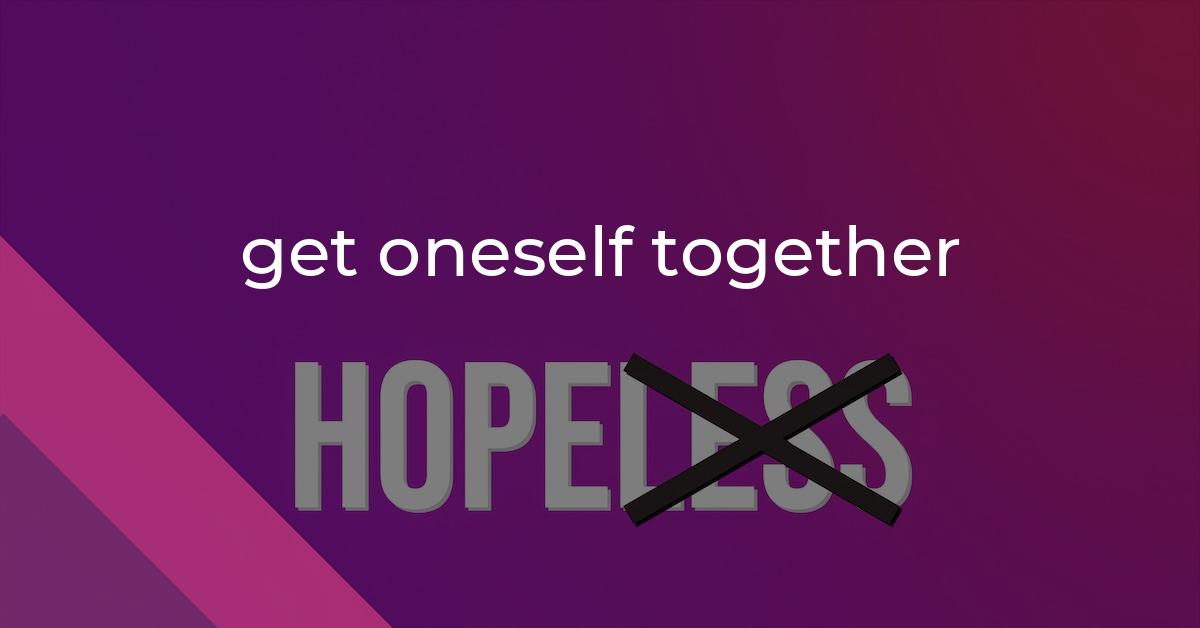get oneself together: Idiom Meaning and Origin
What does ‘get oneself together’ mean?
The idiom "get oneself together" means to regain composure or emotional stability after a period of confusion, distraction, or disorganization.

Idiom Explorer
The idiom "pull oneself together" means to regain control of one's emotions or behavior after being upset, distracted, or disorganized. It implies the need to gather one's thoughts or compose oneself in order to handle a difficult or challenging situation.
The idiom "land on one's feet" means to recover or be successful after a difficult or challenging situation. It suggests being able to adapt and find a positive outcome despite the circumstances.
The idiom "keep one's cool" means to remain calm and composed in a difficult or stressful situation.
The idiom "hold it together" means to remain composed or maintain self-control in a difficult or challenging situation.
The idiom "have one's act together" means to be organized, prepared, and in control of one's life or situation.
The idiom "handle oneself" means to behave or manage oneself in a certain situation. It implies being able to cope or deal with a particular circumstance or challenge independently and competently.
The idiom "gird up one's loins" means to prepare oneself mentally or physically for a difficult or challenging task or situation.
The idiom "get well" means to recover from an illness or injury and return to good health.
The idiom "get together" means to meet or gather with someone or a group of people, typically for socializing or discussing something.
The idiom "get straight" means to clarify or explain something in a direct and understandable manner.
The Essence of Composure
Get oneself together is an idiomatic expression that is widely used in daily conversations among English speakers. The fundamental meaning of this idiomatic phrase is to gather one's thoughts or emotions to become composed or organized. It is commonly used to advise or encourage someone to regain control over their feelings or actions. This phrase can be applied to personal struggles or professional challenges.
There are several related idioms that convey a similar message as "get oneself together." One of these idioms is "pull oneself together." This phrase also emphasizes the act of regaining composure and control over one's actions. Another related idiom is "come to oneself," which implies returning to a state of clarity and rationality after experiencing confusion or disorientation.
In addition to these idioms, another phrase that conveys a similar meaning is "get a grip." This idiom suggests the importance of gaining control or a firm hold on one's emotions or actions. Similarly, "have one's act together" indicates being organized, prepared, and in control. Lastly, the phrase "find oneself" implies discovering or understanding one's true identity or purpose, which can contribute to a sense of composure and self-control.
The origin of the idiom "get oneself together" is not well-documented, but it is believed to have emerged during the mid-20th century. While its usage initially gained popularity in American English, it has since spread to other English-speaking countries. The phrase itself consists of three words, each contributing to its overall meaning.
"Get" implies the process or action of obtaining or acquiring something. In this case, it refers to attaining a state of composure or organization. "Oneself" emphasizes the personal nature of the action, signifying an individual's need to gather their thoughts or emotions. Finally, "together" suggests unity or completeness, emphasizing the state of being in control or well-organized.
The use of the phrase "get oneself together" is most common in informal or conversational settings. It serves as a gentle reminder or encouragement to individuals who may be experiencing disarray or distress. This idiomatic expression is often employed when someone is overwhelmed, confused, or lacking focus.
By using the idiom "get oneself together," individuals strive to motivate others to gather their thoughts, emotions, or actions in order to face challenges with a clearer mind and a more composed demeanor. It emphasizes the importance of self-regulation and encourages personal growth and improvement. It carries a message of taking control over one's emotions and actions.
The versatility of the phrase allows it to be applied in various contexts. It can be used in personal relationships, work environments, or even during times of crisis. Whether it is to overcome a difficult situation or to improve personal well-being, "get oneself together" encourages individuals to take charge of their thoughts and emotions.
"get oneself together" is a commonly used idiomatic expression in English that advises individuals to gather their thoughts, emotions, or actions in order to become composed or organized. Although its exact origins are not documented, it gained popularity during the mid-20th century. This versatile idiom emphasizes self-regulation, personal growth, and the importance of taking control over one's emotions and actions. Despite the mystery surrounding its beginnings, this expression remains relevant and widely used in present-day conversations.
Example usage
Examples of how the idiom "get oneself together" can be used in a sentence:
- After the breakup, she took some time off to get herself together.
- He was feeling overwhelmed, so he went for a walk to get himself together.
- Before the important presentation, she needed a few minutes to get herself together.
More "Selfimprovement" idioms



